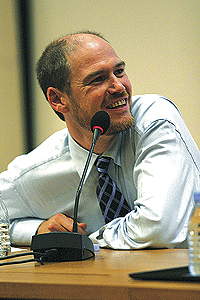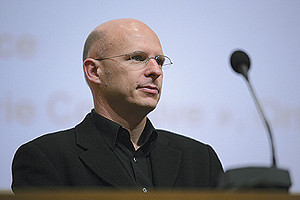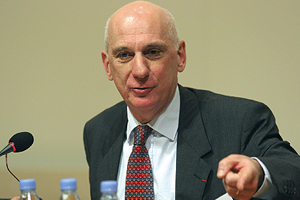University to welcome Collège de France scholars to America for first teaching visit
By Josh SchonwaldNews Office
   From top to bottom, faculty members of the Collège de France Edouard Bard, Stanislas Dehaene and Michel Zink. | |
This fall, the University will become the first American university to offer courses taught by members of one of the world’s most elite scholarly institutions, the Collège de France. For the first time in its nearly 500-year history, the Collège de France will send its faculty to lecture in the United States as part of the Collège de France Visiting Chair Program.
“It’s an incredibly exciting opportunity for us,” said Robert Morrissey, the Benjamin Franklin Professor in Romance Languages & Literatures and Director of the University’s France Chicago Center. “It means we’ll have some of France’s leading figures in fields from French literature and art history to biology and anthropology and economics. We’re getting access to some of the finest minds in the world.”
Founded by King Francois I in 1530, the Collège de France—which is likened to an all-star team of French scholars and includes leading thinkers from more than 50 disciplines—is widely regarded as the pinnacle of a French academic career. Its faculty, which is selected to represent the country’s leading scholars in each discipline, has included some of the world’s most influential thinkers, such as Claude Levi-Strauss, Pierre Bourdieu, Raymond Aron and Michel Foucault.
Under the new agreement initiated by the University’s France-Chicago Center, at least two scholars from the Paris-based Collège de France will come to Hyde Park each year to present a course or a series of lectures. In 2007-2008, the inaugural year of the program, the University will welcome three eminent scholars: the climatologist Edouard Bard, the French medieval literary scholar Michel Zink and neuroscientist Stanislas Dehaene, who was formerly director of the French equivalent of the National Institutes of Health.
“The new accord represents a very important international collaboration in higher-education,” said Jean-Baptiste Main de Boissière, the Consul General of France in Chicago. “Collège de France is one of the most prestigious intellectual institutions in Europe in all fields of knowledge. This program presents an unprecedented opportunity for the University of Chicago to host some of France’s most renowned scholars.”
The idea for the first-of-its-kind agreement began three years ago, when Raymond Pierrehumbert, the Louis Block Professor in Geophysical Sciences, learned from Bard that the Collège de France was encouraging its faculty to lecture abroad. Seeking to raise its profile internationally and engage the work of its faculty with the broader public, the Collège de France formed relationships with institutions throughout the world. Its faculty members, such as Bard, lecture at these institutions as part of their annual teaching responsibilities. The Collège de France has established relationships with universities in Europe, Brazil, Canada and Singapore, but until now did not have an American partnership.
In 2005, Pierrehumbert, then Acting Executive Director of the France Chicago Center, Morrissey, who then was Director of the University’s Paris Center, and Dan Bertsche, Assistant Director of the France Chicago Center, met with Jacques Glowinski, Administrator of the Collège de France. They expected the meeting to be the first step in a lengthy process, but much to their pleasure, Glowinski was equally excited about forging a relationship, and wanted to do so immediately.
Chicago has long enjoyed strong connections with the French research community. Some of France’s leading scholars have taught at Chicago, including the philosopher Paul Ricoeur, the historian Francois Furet and more recently, the literary scholar Marc Fumaroli of the Collège de France and Jean-Luc Marion, the John Nuveen Professor in the Divinity School and the College. Chicago’s profile in France was further raised in 2003, when the University opened its Paris Center near the French National Library.
“The reputation of the University of Chicago is well-known and highly regarded in France,” said Main de Bossière, who added that the 2003 opening of Chicago’s European branch in the heart of Paris was greeted with great excitement.
“It was breathtakingly fast,” said Pierrehumbert of the arrangement. By spring of 2006, the University and the Collège de France had structured the program. “It was a testament to their flexibility and our mutual enthusiasm,” he added.
Bertsche drafted a proposal to the Florence Gould Foundation, which resulted in a grant that has provided much of funding for the program. The Collège de France will continue to pay its faculty members as part of their normal teaching obligations while they are in Chicago.
In addition to providing lecturing opportunities, Pierrehumbert said, efforts will be made to integrate the Collège de France faculty members into the University community during their stay. Faculty members will participate in interdisciplinary workshops, special events, and student meetings, and will discuss their research in a variety of contexts.
Daisy Delogu, Assistant Professor of French in Romance Languages & Literatures and the College, who focuses on French literature of the late 14th and 15th centuries in her work, is structuring a graduate seminar around Zink’s visit in May 2008. Her seminar students will read his work on the relationship between narrative and poetry. “It’s a fantastic opportunity,” she said. “He’s probably the principal living figure in medieval French literary studies.”
Pierrehumbert is hosting Bard in the upcoming Fall Quarter on behalf of the Department of Geophysical Sciences. Bard, the first person to serve in the Collège de France’s newly created chair of Evolution of Oceans and Climate, is internationally renowned for reconstructing past climates using ocean sediment. “He brings a whole new perspective,” Pierrehumbert said, which could inform the research of several Chicago faculty members who are working on various aspects of climate research, such as changes in ocean temperatures and glacial cycles.
Both Pierrehumbert and Delogu said these visits also will be an opportunity for the general public to hear the ideas of these prominent scholars. Delogu noted that they frequently speak before public audiences, and all of their classes are, by charter, open to the public. All public lectures in Chicago will be in English.
Collège de France faculty members are comfortable communicating to general audiences, Delogu said. “I think Zink’s public lecture will be of interest to people throughout Chicago with an intellectual curiosity.”
Collège de France faculty members, anthropologist Philippe Descola and the mathematician Alain Connes, already have been selected for the 2008-2009 academic year. In future years, Morrissey said, the France Chicago Center, which houses the program, will make an effort to choose one faculty member from the biological and physical sciences, as well as one from the humanities and social sciences to visit the University.
Please visit http://www.College-de-france.fr for more information on the Collège de France, or http://fcc.uchicago.edu for information on the France Chicago Center.
![[Chronicle]](/images/sidebar_header_oct06.gif)